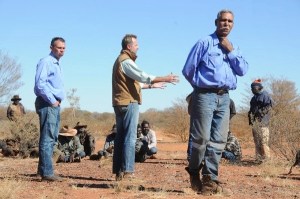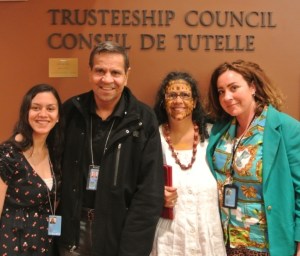NOTE: This press release provided for the information of NACCHO members and stakeholders but not endorsed in anyway by NACCHO
Shadow Indigenous Affairs Minister Senator Nigel Scullion,(pictured above centre on a recent visit to the CENTRE) speaking from the Garma Festival in Arnhem Land, said Minister Jenny Macklin’s speech on Labor’s plans for Indigenous affairs was underwhelming and more about throwing money around, bureaucratic plans and targets rather than results.
“Labor announced $90 million, to come from the Aboriginals Benefit Account (ABA) for government employee housing – I doubt that Aboriginal people living in overcrowded conditions would see government employee housing as a priority,” Senator Scullion said.
“And Labor will make a mess of it in the same way as they did with the hopeless billion dollar plus NT remote housing program. Funding announced for homelands is welcome.
“The ABA is funded through the Aboriginal Land Rights Act to support projects that benefit indigenous people in the Northern Territory. It is Aboriginal money and should not be thrown about in an election campaign as a political football.
“The Coalition supports the proposed new alcohol management plans announced by Ms Macklin but we will ensure it is not done in the typical Labor bureaucratic way that produces nothing on the ground.
“Ms Macklin cannot pretend to take the high moral ground on alcohol plans when it was her and the Rudd/Gillard/Rudd Government that approved Aboriginal money to bankroll two Alice Springs IGA supermarkets that sell alcohol to Aboriginal people. Police have reported three breaches of alcohol licensing requirements at these supermarkets to do with irresponsible service of alcohol to indigenous people.
“The Coalition will provide bipartisan support for Labor’s proposed new Closing the Gap targets on incarceration rates, higher education and disability services but I am worried if we get too many targets they will lose their impact and then we could lose focus. But it is not the targets that make the difference its results that count – we need more than good intentions. Delivery has not been the strong suit of the Rudd/Gillard/Rudd Government.
“Arguable progress in only three of the six closing the gap targets is not much of a scorecard. The results for indigenous education indicators are going backwards – in 2012, 14 out of the 20 NAPLAN indicators the gap has widened compared to 2011. The results in remote and very remote areas are a disgrace.
“The Coalition is focused on results and remains committed to the concept of rights, recognition and indigenous-led responsibility as fundamental building blocks of our Indigenous Affairs policy,” Senator Scullion said.
For further information contact Senator Scullion:
- Darwin electorate office (08) 8948 3555
- Canberra Parliament House (02) 6277 3867
- Media adviser Russel Guse 0438 685 645
Related articles
- NACCHO political debate alert :Aboriginal policy- check out where the parties stand (nacchocommunique.com)
- NACCHO political download alert: Tony Abbott and Warren Mundine puts land rights at heart of Aboriginal policy approach (nacchocommunique.com)
- NACCHO download and updated press release: National Aboriginal heath plan will help close the gap (nacchocommunique.com)
- NACCHO political alert: What is the future of Aboriginal leadership and activism ? (nacchocommunique.com)
- NACCHO political alert: One size does not fit all with Aboriginal policy (nacchocommunique.com)
- NACCHO Blueprint 2013- 2030 news – AMA supports important initiatives to Improve the health of Aboriginal Males (nacchocommunique.com)














